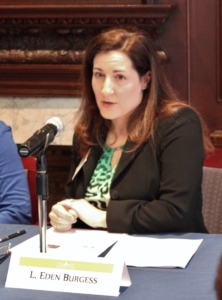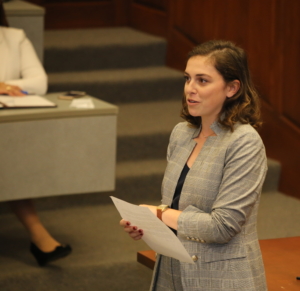By Marion Werkheiser, Eden Burgess, and Jessica Krauss
At Cultural Heritage Partners, we are fortunate to work with great clients in a fascinating legal field. As a result, we get many inquiries from law school students and recent grads asking how they, too, can practice cultural heritage law.
In this blog post, we answer some of the most frequently asked questions and provide guidance to the next generation of lawyers who want to practice in art, museum, cultural heritage, historic preservation, and related fields.
How can I break into cultural heritage law?
Show a Demonstrated Interest. The attorneys who work in this field are extremely dedicated to their work, so it helps if you can show the same level of interest. Attend conferences, intern or volunteer in related fields, and join relevant law school or professional groups. Some national conferences offer scholarships to interested students, such as the Diversity Scholars or the NCPE scholarship, and many will also offer significant student discounts (such as the Lawyers’ Committee for Cultural Heritage Preservation). Show that cultural heritage law is a serious career choice that you’re passionate about, rather than a passing interest.

Network, But Do So Thoughtfully. Lawyers have busy schedules. Before reaching out to ask for a phone call or coffee, make sure you do your research and create a list of specific questions you want to ask (that are not answered in this post!). Know what specific areas of the field you are interested in, and reach out to professionals who share a similar background or interest. And don’t discount associates—if you are hoping to schedule some quality time for a phone call or coffee, it’s likely that an associate will have more availability than a partner. Once you do get the chance to talk, come prepared and try to maintain the connection over time.
Find a Mentor. A mentor can be valuable in any field, but in a small, popular field like cultural heritage, a mentor can help you build skills and navigate the practice area. Finding a mentor can also connect you with their network and give you the opportunity to learn and grow from an established expert. Furthermore, a mentor will know you and your work well, so can recommend you for opportunities.
Get Great Recommendations. It’s not only who you know, but what you have done that can help you make connections. We get a lot of emails from students and grads, and being introduced through someone who vouches for your work product and character can make a big difference in distinguishing yourself. The best way to get a great recommendation is to go above and beyond in your work, including in internships, to ensure the people you work with will provide enthusiastic support.

Where to Begin? If you are looking to jump into the field right out of law school, a word of advice: getting in “through the backdoor,” so to speak, may be easier. For example, Marion began her career practicing corporate, regulatory and international trade law, and also became a seasoned lobbyist and community organizer before combining that experience with her first loves – cultural heritage and archaeology – and founding CHP. Eden started out as a civil litigator, then gained broad experience in museum, art and auction house disputes. Will got his start as an appellate law clerk, followed by complex civil litigation, art law, preservation law as a local advocate, and then as a law professor teaching property, appellate practice, constitutional law, and historic preservation law. If getting a job in the art and cultural heritage law field is your ultimate goal, and entry level positions are not available, try to get a job that will develop transferrable skills that could help you get an art or cultural heritage law job five or ten years down the road. The best path to take will depend on which particular area of art and cultural heritage law most interests you.
What classes should I take in law school?
We usually recommend the following courses to students interested in art and cultural heritage law (we didn’t take some of these and often wish we had!):
Administrative Law. Federal, state, and local agencies play a big role in carrying out preservation statutes, meaning that much of historic preservation law is administrative law. Get familiar with the Administrative Procedure Act and understand the interplay between law and regulations, and how agencies function.
Indian Law. Many cultural preservation cases involve Indian Law, and you would be surprised how few lawyers are familiar with this important body of law. Tribes hold a special place at the table when it comes to consultations, and tribes are often deeply involved in heritage issues, so understanding Indian Law can make a big difference in successful representation.
Nonprofit Taxation and/or Governance. Many entities in the art and cultural heritage field are nonprofits; learning about the rules under which they operate is critical. If you are looking for a more in-depth study of this, an LLM in Taxation Law is an additional option for those looking to approach art law from the nonprofit side.
Alternative Dispute Resolution or Negotiations. The skills taught in these courses are applicable in almost any situation. Also, art and cultural heritage entities generally prefer to resolve disputes through ADR rather than litigation.
Wills, Trusts & Estates, Family Law, and Bankruptcy. Disputes over artworks often arise because of the 4 Ds: death, divorce, debt, and disaster.
Land Use or Zoning Law. Many historic preservation goals are achieved through use of local ordinances—understanding how they work is important.
Any classes your law school offers in art, historic preservation, or cultural heritage law. The LCCHP and Center for Art Law try to maintain a list of relevant courses offered at law schools around the country. If your law school doesn’t offer any such courses, consider organizing your own. Many schools offer opportunities for independent studies and directed readings that let you set your own course of study. If that isn’t an option, taking seminar courses that give an opportunity to write a research paper that connects to cultural heritage can be a great opportunity to conduct your own research (and gives you a ready submission for LCCHP’s annual student writing competition!).
Other recommended courses include Intellectual Property, First Amendment law, and Federal Taxation. Take courses that appeal to you.
Do I need a Master’s Degree? Do I need to speak another language?
Yes and no … that is, many applicants for legal positions in the art and cultural heritage field have a Master’s Degree in art history or archaeology and speak another language (or multiple other languages). Particularly in the art law side of the field, foreign language skills can be especially helpful. These are not strict requirements for a successful career, but bear in mind who your competition may be in the job market.
How should I get involved as a student?
The LCCHP is a great resource for students interested in a legal career in this field. It offers a reduced rate for student members and annual writing and moot court competitions, and lists career opportunities on its website.

Join your law school’s art law society. If there isn’t one, start one; it looks great on your resume, and you can find other students with similar interests who may be good contacts in the future.
Attend topical conferences to expand your network. As they say, who you know is often more helpful than what you know (but make sure to do it thoughtfully). You can learn more about the field while also expanding your professional network at conferences held throughout the year on art and cultural heritage law topics. We often post relevant conferences on our Facebook page.
Think about other skills and knowledge that will help you stand out from the competition. Leadership and communication skills, for example, are in high demand by employers and will help you meet goals in all walks of life. If your university doesn’t provide this training, the ARCUS leadership program developed specifically for the cultural resources field is a good option for sharpening your abilities.
Is there really a future in the practice of art and cultural heritage law?
Yes, yes, yes! Even a quick look at CHP’s Facebook page on any given day will show how important this field is and its many intersections with politics, diplomacy, infrastructure development, and civil rights, just to name a few. Clients who have art and cultural heritage law challenges need and deserve reliable legal advice from well-prepared and experienced practitioners.
* * *
CHP is thrilled to know that there is a next generation of lawyers excited about art and cultural heritage law. It bodes well for our clients and for the world’s art and cultural heritage.
If you are interested in an internship, summer clerkship, or other position with CHP, please check our website and Facebook page for announcements when positions are available. Thanks for your interest.
